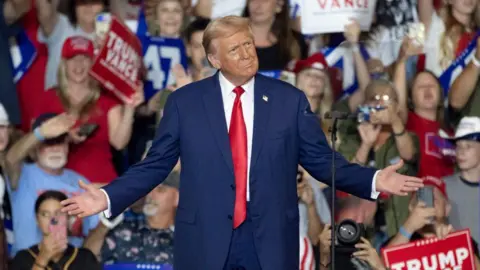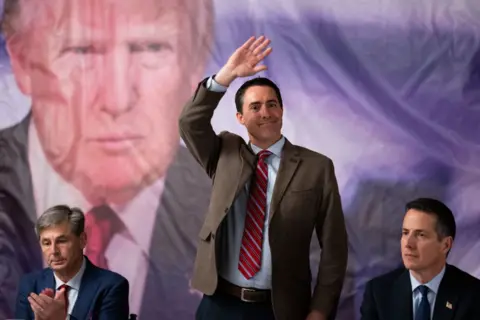Investigating Trump campaign’s biggest illegal voter claim
 Getty Images
Getty ImagesThe message was addressed to “REAL AMERICAN PATRIOTS” to ensure a victory “TOO BIG TO RIG!”
Sent out to a mailing list by the Republican National Committee co-chair Lara Trump, it combined two of the biggest themes of Donald Trump’s campaign: immigration and alleged election fraud.
“Experts are saying that as many as 2.7 million illegals could vote in November,” read the email from Ms Trump - the former president’s daughter-in-law.
But the number cited is derived from a decade-old survey that has been heavily disputed.
And while there is some clear evidence that some immigrants are registered to vote, it’s equally clear that the 2.7 million figure is a major exaggeration.
The origin story
The roots of the statistic are found in an article, “Do non-citizens vote in U.S. elections?”, published in the journal Electoral Studies in 2014.
Written by three academics led by Jesse Richman, an associate professor at Old Dominion University in Virginia, the paper says the "number of non-citizen voters… could range from just over 38,000 at the very minimum to nearly 2.8 million at the maximum”.
Mr Richman and his colleagues did not comb through voter rolls or personally survey immigrants to come to that conclusion, but instead relied on a data set from a long-running Harvard-backed survey called the Cooperative Election Study (CES).
The CES is conducted every year, and Mr Richman examined a number of respondents who self-identified as non-citizens and indicated that they had voted in the 2008 and 2010 elections.
But the people behind CES have repeatedly rejected the conclusions of Mr Richman's paper, which attracted controversy and attention before and after the 2016 presidential election.
Brian Schaffner, a Tufts University professor who is one of the CES co-principal investigators, told the BBC that it’s not possible to draw statistical conclusions from a relatively small number of survey participants.
The CES is intended to be a survey of legal voters, and few respondents say they are non-citizens. For example, in 2008, 339 out of the nearly 34,000 survey participants said they were not US citizens. The proportion was similar in 2010.
That does not constitute a representative sample of the population, Schaffner said, and it's a commonly known issue in large surveys - a small proportion of people click wrong or untrue answers.
The 1% claim
In recent years, the CES has included more detailed questions about citizenship and registration with the aim of increasing accuracy.
Mr Richman, the author of the Electoral Studies article, drew on that more recent CES data to conclude in 2023 that 1% of non-citizens were registered to vote. That would be approximately 117,000 people based on official estimates of how many undocumented immigrants are in the US.
In an interview with the BBC, he said he stood by his findings - but noted that a substantial uncertainty about non-citizen voting registration and voting remained.
"Predictably, according to what tends to happen in American politics, each side focuses on the edge of that uncertainty that is most convenient," Mr Richman said.
"Democrats would like there to be absolutely none. Republicans would like it to be a monster that is about to eat democracy. Both of those interpretations are not likely."
But Mr Schaffner, the CES official, is equally adamant about his argument, that the study he administers is simply not suitable for extrapolation to the population at large to create an estimate of non-citizen voting.
The 2.7 million number
The non-citizen voter claims were given new life in May 2024, when a conservative fact-checking organisation, Just Facts, which describes itself as non-partisan, published an article headlined: “Study: 10% to 27% of Non-Citizens Are Illegally Registered to Vote”.
The post asserted that “roughly 1.0 million to 2.7 million [immigrants] will illegally vote” in November’s election.
The claim went viral in right-wing spaces online, and were spread by news sites and conservative influencers. Elon Musk, who has repeatedly posted misleading messages about immigrants and voting to millions of his followers, shared this post as well.
Lara Trump mentioned the figure in two emails sent out to supporters in early October.
When contacted by the BBC, Just Facts founder James Agresti said he stood by his conclusions, although he characterised the Trump campaign claim as a “half truth, because the study has sizable margins of uncertainty” - and that the email from Lara Trump had used the highest possible number.
Mr Agresti said his calculations - which are based on CES data but with a modified methodology to Mr Richman's and additional studies and data sets - had found the minimum number of non-citizens registered to vote was around 10 times higher at roughly a million.
Lack of real-world evidence
Beyond the dispute over methodology, there is another problem with the argument that large numbers of immigrants are voting illegally: there are very few confirmed cases of it.
The right-wing Heritage Foundation think tank compiled a database that includes decades of voting fraud cases. But only about 100 include a reference to non-citizens voting.
Criminal prosecution of illegal voters - not just non-citizens, but felons and other ineligible voters - is also extremely rare.
Despite nearly a decade of attention on illegal voting driven by Trump and Republicans, those numbers have not dramatically risen. Investigations into voter rolls show very few non-citizens registered to vote and even fewer voting.
Conservatives, and some scholars such as Mr Richman, allege that there are so few prosecutions because illegal voting is considered to be a minor crime by many. They say that authorities have spent few resources investigating it in the past.
Still, recent searches of active voter rolls - largely inspired by Trump and Republican Party officials - have turned up a relatively small number of illegal voters.
Mr Richman conducted a survey of Arizona's four million voter records and found between 1,934 and 6,480 non-citizens registered to vote.
Earlier this year, the office of Ohio’s Republican Secretary of State Frank LaRose - a Trump supporter - examined around eight million registrations and found around 600 people on the state’s voter rolls who could not prove their US citizenship.
 Getty Images
Getty ImagesMeanwhile, the state also struck an additional 155,000 registrations from the rolls, largely because of address changes.
Other states, including New Jersey and Virginia, have also removed hundreds of voters from their rolls in recent years - but the totals have not come close to the 10-to-27% figure cited in the Just Facts blog post.
Databases of criminal cases and official investigations of voter rolls have failed to find evidence of large proportions of immigrant non-citizens who are registered to vote.
The proportion of those who actually vote are, by definition, smaller still. Generally about half to two-thirds of registered American voters turn out to vote in presidential elections.
And the subset of those immigrants who do not have legal permission to be in the US - the "illegals" in Lara Trump's email - is by definition even smaller.
While it's clear that there are some non-citizens who are registered to vote, there's a lack of real-world evidence that those numbers are very large when compared to the overall voting population.
The BBC contacted the Trump campaign and the Republican National Committee for comment.
Do you live outside the US and have a question about the election? Tell us here or use the form below.

- SIMPLE GUIDE: How to win a US election
- EXPLAINER: What Harris or Trump would do in power
- GLOBAL: Harris or Trump? What Chinese people want
- ON THE GROUND: Democrats take fight deep into Trump country
- FACT-CHECK: What the numbers really say about crime
- POLLS: Who is winning the race for the White House?

North America correspondent Anthony Zurcher makes sense of the race for the White House in his twice weekly US Election Unspun newsletter. Readers in the UK can sign up here. Those outside the UK can sign up here.
